"The art and science of asking questions is the source of all knowledge."

Where Ancient Wisdom Meets AI in the Quest for Knowledge
Imagine a world where the wisdom of Socrates meets the processing power of advanced AI, all delivered through the intimacy of your favorite podcast. This isn't a far-off sci-fi scenario—it's the cutting edge of modern education. In today's rapidly evolving technological landscape, we stand at the precipice of a revolutionary fusion: the marriage of timeless questioning techniques with cutting-edge artificial intelligence and innovative learning methodologies.
This essay argues that the combination of strategic questioning, AI-powered knowledge synthesis, and audio-based learning tools creates an unparalleled opportunity for deeper, more efficient, and more personalized learning experiences. As we navigate this new frontier, we'll explore how this synergy is not just changing the way we learn, but fundamentally reshaping our relationship with knowledge itself.
The Fundamental Power of Questioning
"To question is to think. To think is to grow."
This simple yet profound concept has been the bedrock of human intellectual advancement for millennia. When we pose a question, we're not just seeking information—we're igniting a cognitive spark that illuminates the shadows of our understanding. It's a mental workout that flexes our critical thinking muscles and stretches the boundaries of our knowledge.
The act of questioning is a multifaceted cognitive process. It requires us to:
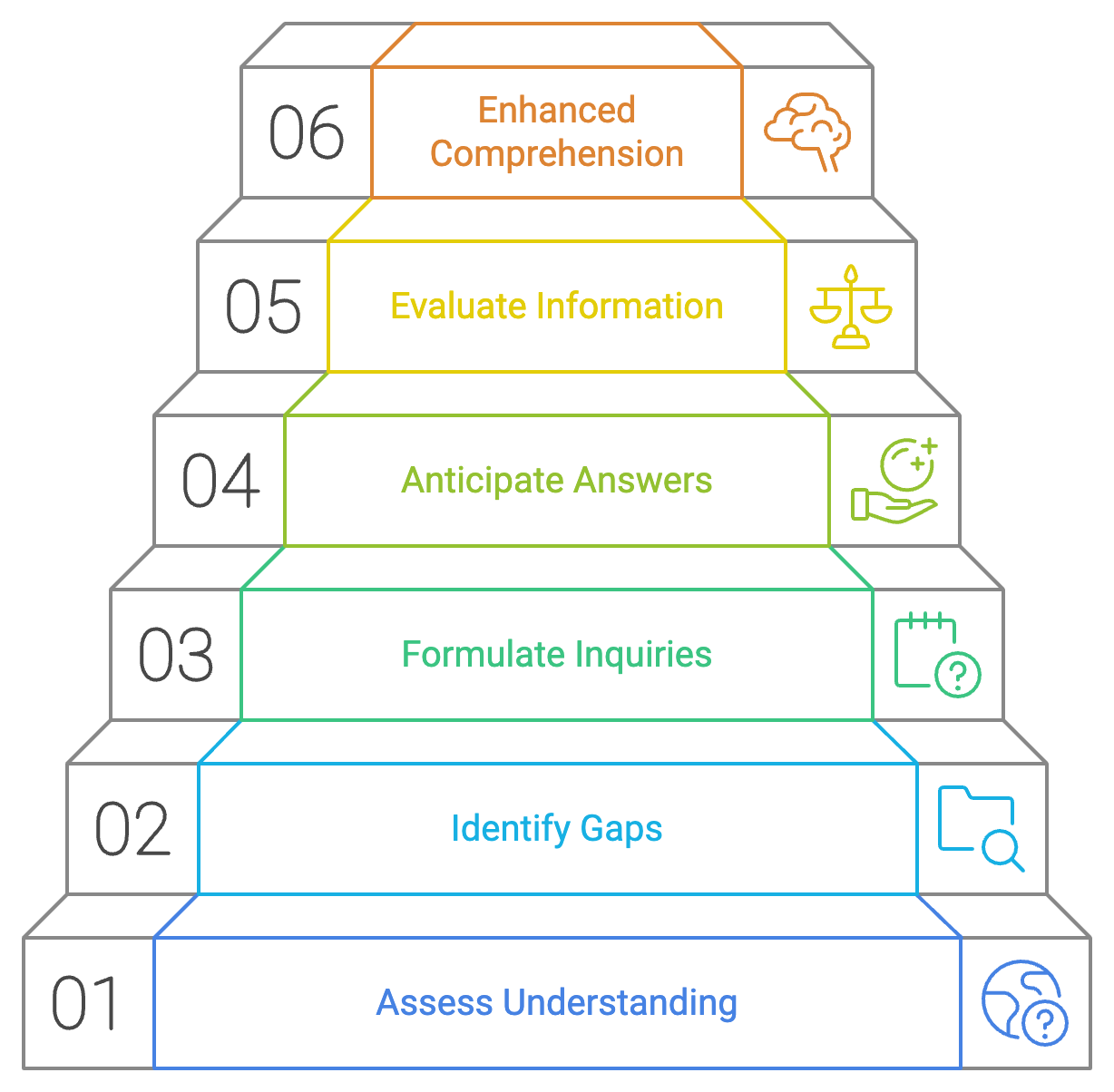
This process alone enhances our cognitive abilities, priming our minds to receive, process, and retain new information more effectively. It's a form of mental calisthenics that keeps our intellect agile and our curiosity alive.
Research has consistently shown that active questioning improves comprehension, retention, and the ability to apply knowledge in diverse contexts. For instance, a meta-analysis conducted by the National Reading Panel found that teaching students to generate questions while reading significantly improves their comprehension skills. Similarly, studies in classroom settings have demonstrated that students who engage in regular questioning achieve higher academic performance across various subjects.
The power of questioning extends beyond individual learning. In educational settings, it serves as a catalyst for collective knowledge construction. When students engage in peer-to-peer questioning, they're not just seeking answers; they're participating in a collaborative process of knowledge refinement. This social dimension of questioning fosters critical thinking, promotes diverse perspectives, and cultivates a culture of intellectual curiosity.
Moreover, questioning is not just a tool for students; it's a powerful teaching strategy. When educators ask thoughtful, probing questions, they encourage students to think more deeply about the subject matter, make connections between different concepts, and develop their analytical skills. Higher-order questions, in particular, challenge students to go beyond mere recall and engage in complex cognitive processes such as analysis, synthesis, and evaluation.
Consider the Socratic method, a time-honored approach that uses probing questions to stimulate critical thinking and illuminate ideas. This method doesn't just impart knowledge; it teaches students how to think, how to analyze, and how to question their own assumptions. In essence, it equips learners with the tools to become lifelong self-educators.
The AI Revolution in Learning
While the benefits of questioning are well-established, we now stand at a unique moment in history where the power of human inquiry can be amplified exponentially by artificial intelligence. Large Language Models (LLMs) like GPT-4 represent a quantum leap in our ability to access, process, and synthesize vast amounts of information.
Consider this: when you pose a question to an AI-powered system, you're essentially tapping into the collective knowledge of millions of sources, distilled and organized by algorithms trained on an unprecedented scale. It's like having a round-table discussion with history's greatest minds, from Aristotle to Einstein, all speaking in unison to provide a synthesized, coherent response in seconds. This isn't just information retrieval; it's knowledge alchemy, transforming raw data into golden insights tailored to your specific inquiry.
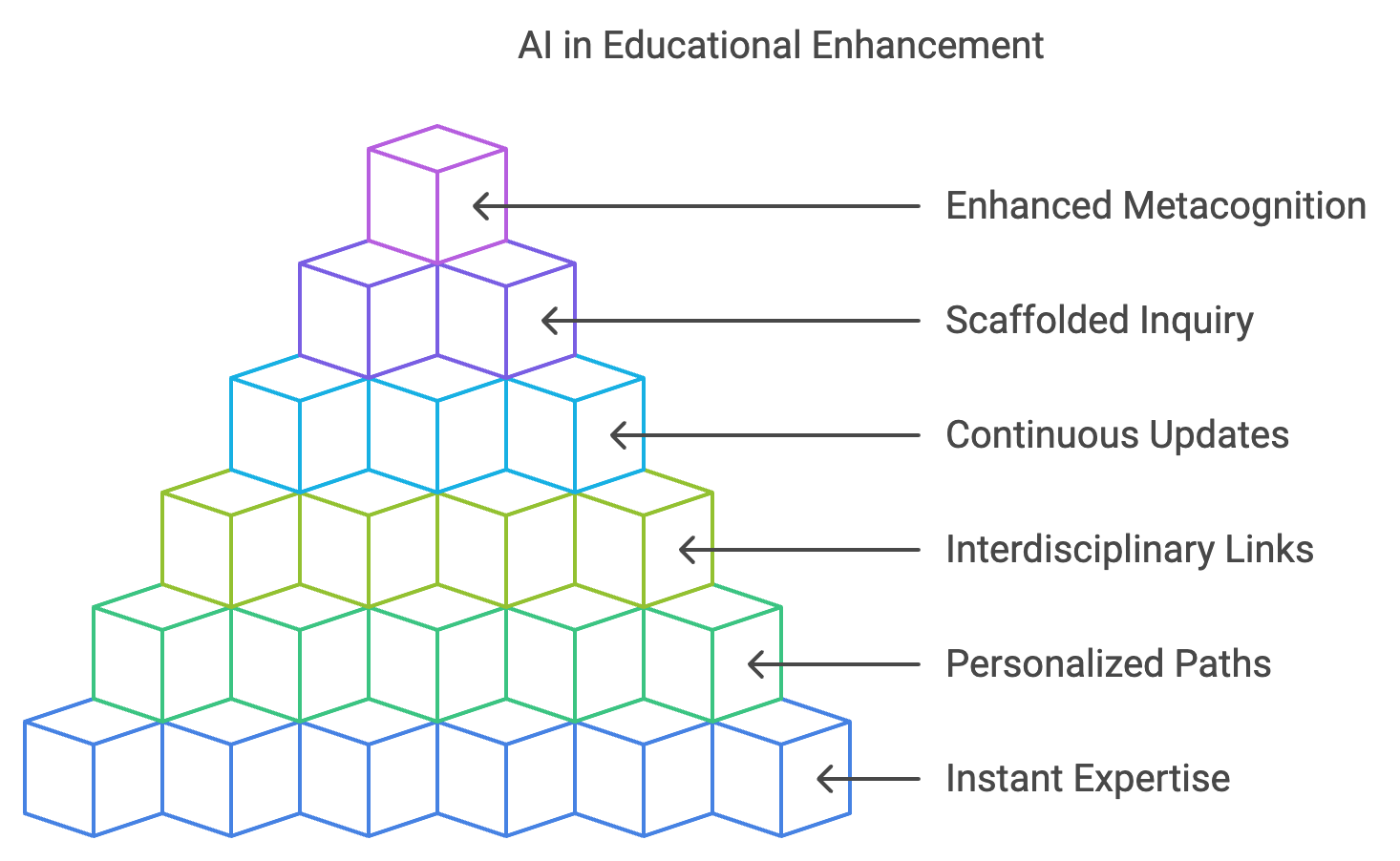
This capability transforms the landscape of learning in several ways:
- Instant access to expert-level knowledge: Learners can now receive high-quality, nuanced answers to complex questions almost instantaneously, democratizing access to expertise. This levels the playing field, allowing anyone with an internet connection to tap into a wealth of knowledge previously accessible only to those with extensive education or resources.
- Personalized Learning Paths: AI can adapt its responses based on the learner's prior knowledge, learning style, and specific interests, creating a tailored educational experience. Imagine an AI tutor that remembers every question you've asked, every concept you've struggled with, and adjusts its teaching style accordingly. It's like having a personal mentor who knows you better than you know yourself.
- Interdisciplinary Connections: LLMs can draw connections between seemingly unrelated fields, fostering a more holistic understanding of complex topics. This cross-pollination of ideas can lead to innovative insights and creative problem-solving approaches that might not emerge in traditional, siloed learning environments.
- Continuous Learning and Updating: Unlike static textbooks, AI-powered learning tools can incorporate the latest research and developments in real-time, ensuring that learners always have access to current information. This is particularly crucial in rapidly evolving fields like technology, medicine, and environmental science.
- Scaffolded Inquiry: AI can guide learners through a series of increasingly complex questions, helping them build a comprehensive understanding of a topic step by step. This progressive approach ensures that learners develop a solid foundation before tackling more advanced concepts, reducing frustration and enhancing overall comprehension.
- Enhanced Metacognition: By analyzing patterns in a learner's questions and responses, AI can provide insights into their learning process, helping them understand how they learn best. This metacognitive awareness is a powerful tool for lifelong learning and self-improvement.
The Synergy of AI and Audio-Based Learning
Picture this: You're on your morning jog, earbuds in, but instead of music, you're engaged in a Socratic dialogue with an AI tutor about quantum physics. As your feet hit the pavement, complex ideas about wave-particle duality are broken down into digestible audio bites, perfectly paced to your learning style and previous knowledge. This isn't just multitasking; it's cognitive symbiosis—a fusion of physical activity, auditory learning, and AI-driven personalization that represents the next frontier in education.
The integration of AI with audio-based learning tools creates a powerful synergy that capitalizes on our natural affinity for oral communication. Humans have evolved as storytellers and listeners; our brains are wired to process and retain information presented in spoken form effectively. By harnessing the power of AI to generate conversational, audio-based content, we can create a learning experience that feels natural, engaging, and highly effective.
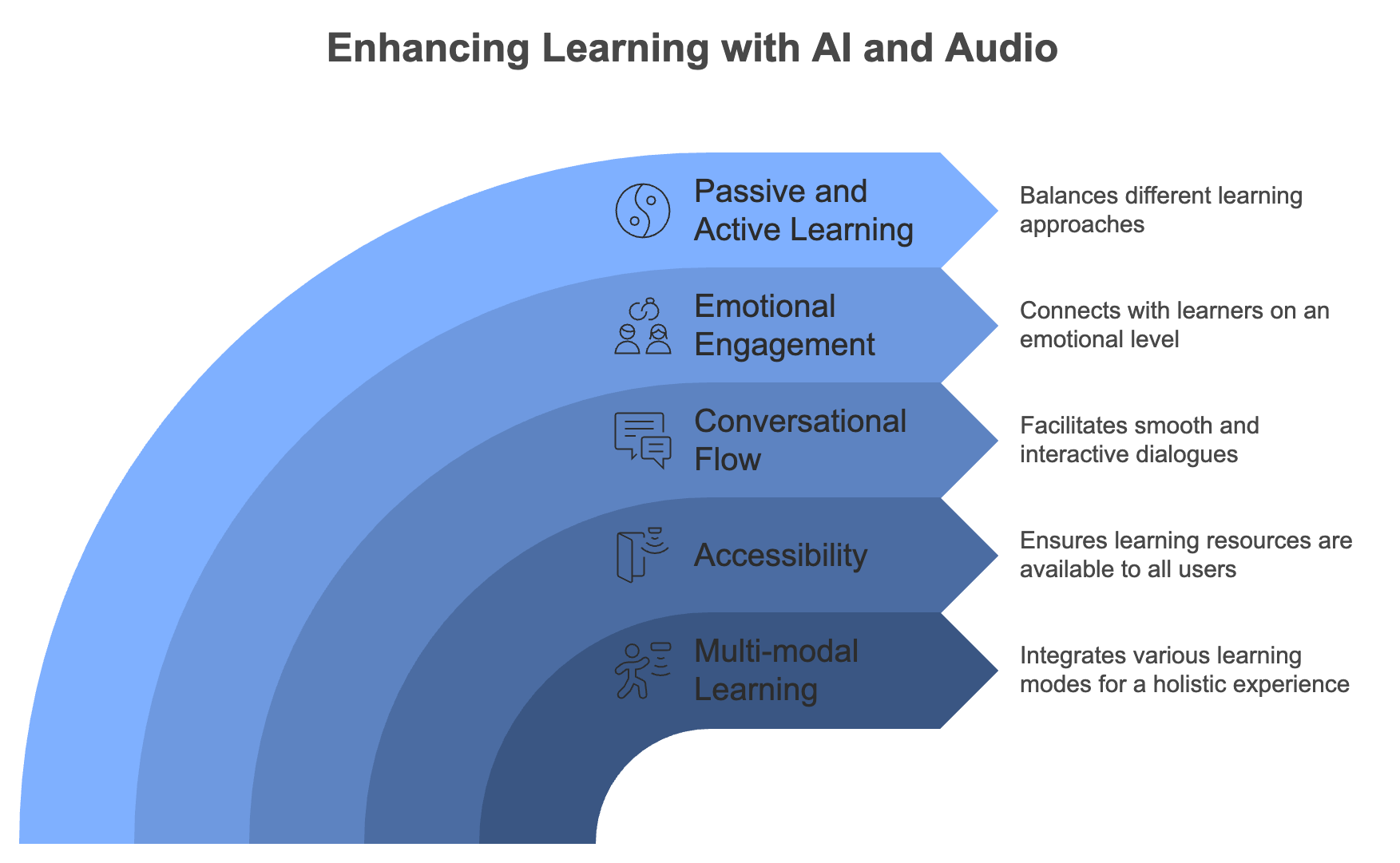
Imagine a scenario where a learner can engage in a Socratic dialogue with an AI tutor, asking questions and receiving responses in real-time through an audio interface. This approach offers several unique advantages:
- Multi-modal Learning: Combining auditory input with the cognitive processes involved in questioning creates a rich, multi-modal learning experience that enhances retention and understanding. This approach engages multiple sensory pathways, reinforcing learning and making it more memorable.
- Accessibility: Audio-based learning tools make education more accessible to those with visual impairments or reading difficulties, as well as allowing for learning during activities where reading isn't possible (e.g., commuting, exercising). This democratizes education, making it available in more contexts and to a wider range of learners.
- Conversational Flow: The back-and-forth nature of an audio dialogue mimics natural human conversation, making the learning process feel more intuitive and less intimidating. This can reduce the cognitive load associated with learning, allowing learners to focus more on content and less on navigating a complex interface.
- Emotional Engagement: Voice can convey nuance, enthusiasm, and emphasis in ways that text alone cannot, potentially increasing emotional engagement with the material. An AI tutor could modulate its tone to match the content, using excitement to highlight key points or a softer tone for more reflective moments.
- Passive and Active Learning: Learners can switch between passive listening and active questioning, allowing for flexibility in their engagement level based on their current cognitive capacity and environment. This adaptability makes it easier to integrate learning into daily life, turning idle moments into opportunities for growth.
- Personalized Pacing: AI can adjust the speed and complexity of the audio content based on real-time feedback from the learner, ensuring that the material is always challenging but not overwhelming. This dynamic adjustment can help maintain the learner's engagement and motivation.
Practical Applications and Case Studies
To illustrate the potential of this combined approach, let's explore some practical applications and hypothetical case studies:
- Language Learning: An AI-powered audio tutor could engage learners in conversational practice, answering questions about grammar, vocabulary, and cultural nuances while adapting to the learner's proficiency level in real-time. Imagine learning Mandarin during your daily commute, with the AI adjusting its speech rate and complexity as your skills improve.
- Medical Education: Medical students could use an AI system to practice patient interviews, asking questions about symptoms and receiving realistic responses, helping them develop their diagnostic skills. The AI could simulate various patient personalities and conditions, providing a safe environment for students to hone their bedside manner and clinical reasoning.
- Historical Analysis: Students of history could engage in simulated conversations with AI representations of historical figures, asking questions to gain deeper insights into their motivations and the context of their actions. Picture debating the merits of the New Deal with an AI "FDR" or discussing the Renaissance with a virtual Leonardo da Vinci.
- Scientific Exploration: Researchers could use AI-powered audio tools to brainstorm hypotheses, asking questions that help them explore potential experimental designs and anticipated outcomes. This could accelerate the scientific process by quickly identifying promising avenues of inquiry and potential pitfalls.
- Professional Development: Employees could use an AI learning assistant during their commute, asking questions about industry trends, best practices, and skill development, receiving personalized audio lessons in response. This "micro-learning" approach could help professionals stay current in rapidly evolving fields without sacrificing work-life balance.
- Creative Writing: Authors could engage in dialogue with AI characters they've created, asking questions to develop deeper backstories and more consistent personalities. This interactive approach to character development could lead to richer, more nuanced storytelling.
Addressing Potential Concerns
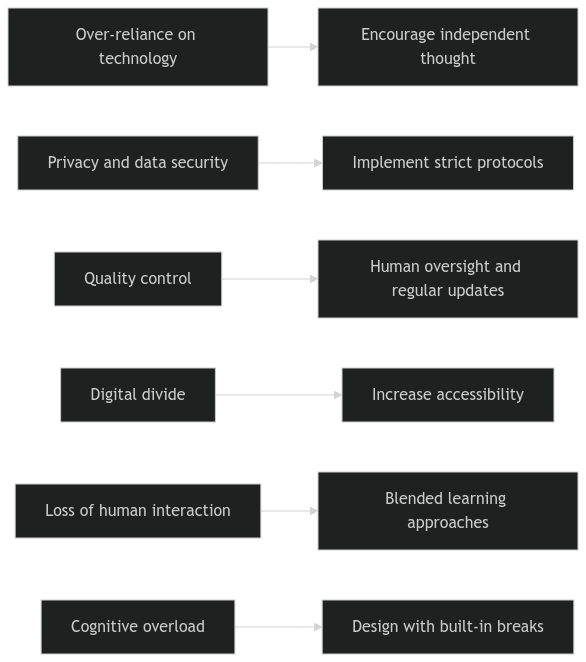
While the integration of AI and audio-based learning tools with questioning techniques offers immense potential, it's important to address potential concerns:
- Over-reliance on Technology: There's a risk that learners might become too dependent on AI for answers, potentially diminishing their own critical thinking skills. To mitigate this, it's crucial to design these tools to encourage independent thought and to use them as supplements to, rather than replacements for, human-led education.
- Privacy and Data Security: As with any AI system, there are concerns about data privacy and security. Strict protocols must be in place to protect learners' personal information and their learning data. Encryption, anonymization, and transparent data policies should be standard features of these systems.
- Quality Control: While AI systems are incredibly powerful, they can sometimes produce inaccurate or biased information. Ongoing human oversight and regular updates are necessary to ensure the quality and accuracy of the information provided. Implementing fact-checking mechanisms and clear indicators of AI-generated content can help maintain trust in the system.
- Digital Divide: Access to advanced AI and audio learning tools may be limited by economic factors, potentially exacerbating educational inequalities. Efforts must be made to make these technologies widely accessible, perhaps through public libraries, community centers, or subsidized programs for low-income learners.
- Loss of Human Interaction: While AI can simulate conversation, it's important not to lose sight of the value of human-to-human interaction in education. These tools should enhance, not replace, human teachers and peer learning experiences. Blended learning approaches that combine AI-assisted instruction with human-led discussions could offer the best of both worlds.
- Cognitive Overload: The constant availability of information and learning opportunities could lead to cognitive overload or burnout. It's important to design these systems with built-in breaks and to educate users about the importance of rest and reflection in the learning process.
From Learning to Wisdom
As we stand on the brink of this learning revolution, we're not just turning a page in the book of education—we're rewriting the entire volume. The fusion of age-old questioning techniques with AI's vast knowledge synthesis and the intimacy of audio learning isn't just an upgrade; it's a quantum leap in how we acquire and process information. We're not just learning faster or more efficiently; we're fundamentally reshaping the landscape of human knowledge acquisition.
This new paradigm offers unprecedented opportunities for personalized, accessible, and engaging education. It has the potential to democratize learning, breaking down barriers of geography, economics, and even personal limitations. With AI-powered tools, we can turn every moment into a learning opportunity, every question into a gateway to deeper understanding.
However, as we embrace these powerful new tools, we must do so thoughtfully and responsibly. We must ensure that they augment rather than replace human intelligence, that they foster critical thinking rather than passive consumption of information. The goal should be to create not just knowledgeable individuals, but wise ones—people who know not just what to think, but how to think.
As we move forward, it's crucial that we approach this integration with a balance of enthusiasm and caution. We must address the potential concerns head-on, developing ethical guidelines, ensuring equitable access, and always keeping the human element at the center of the learning experience. With careful implementation, the fusion of questioning techniques, AI, and audio-based learning has the potential to accelerate the pace of learning, unlock new realms of human potential, and perhaps even redefine what it means to be educated in the 21st century.
In this new paradigm, every question becomes a key, capable of unlocking vast repositories of knowledge. It's as if we've been handed a universal remote control for the world's collective wisdom, with the power to pause, rewind, and zoom in on any concept at will. But as we wield this incredible tool, let's remember that true wisdom lies not just in the answers we receive, but in the questions we dare to ask. In the end, it's our curiosity—that quintessentially human trait—that will continue to drive us forward, ensuring that even in an age of artificial intelligence, our learning remains profoundly, beautifully human.
As we embrace this exciting new era of education, let us do so with open minds and critical eyes, always questioning, always learning, always growing. For in this fusion of human inquiry and artificial intelligence, we may just find the key to unlocking the full potential of both.
Courtesy of your friendly neighborhood,
🌶️ Khayyam


Knowware — The Third Pillar of Innovation
Systems of Intelligence for the 21st Centurty

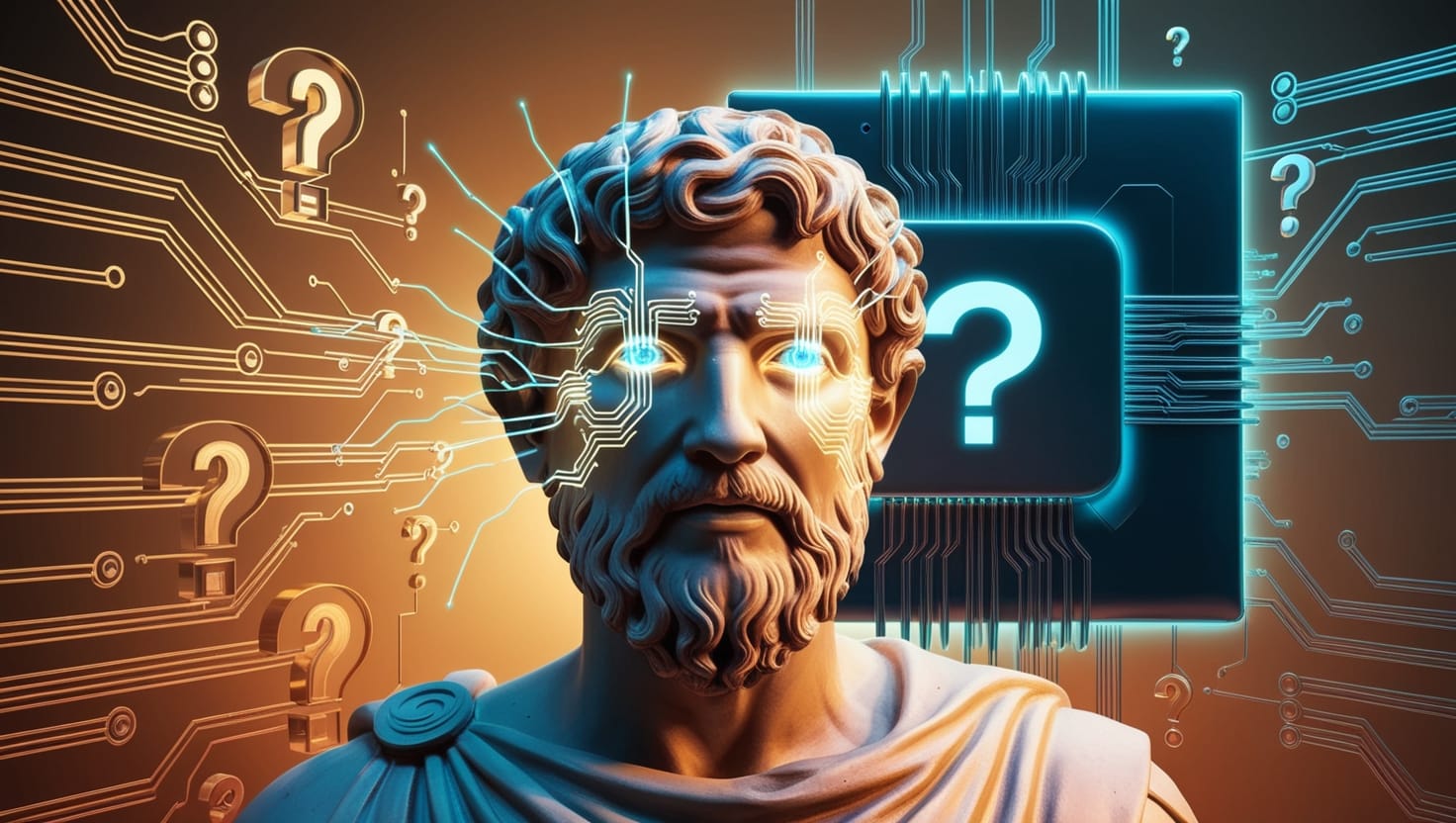






Member discussion